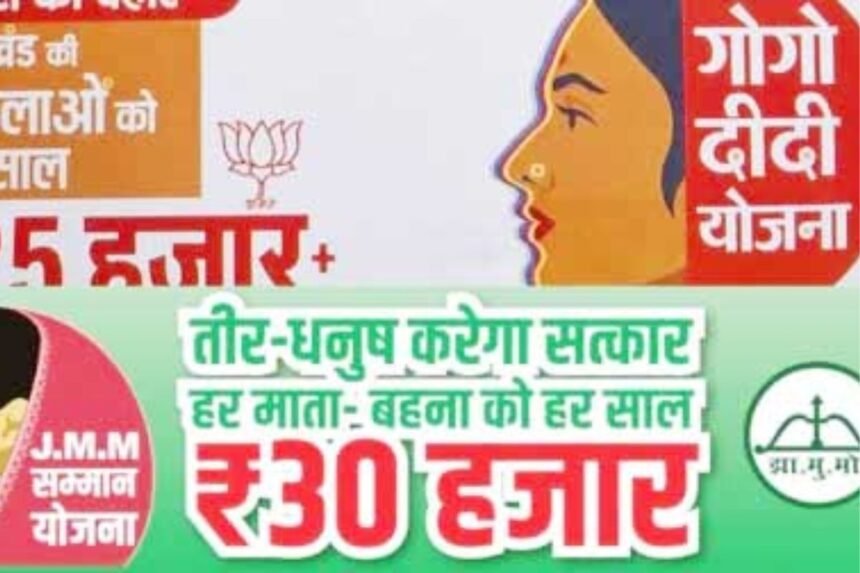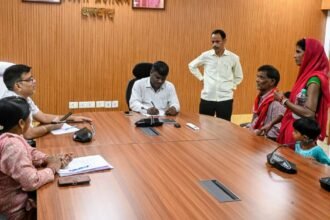Jharkhand Headlines Desk, October 16, 2024: As Jharkhand heads towards assembly elections on November 13 and 20, two schemes – ‘Maiya Samman’ by the Jharkhand Mukti Morcha (JMM), Congress alliance and the ‘Gogo Didi’ scheme by the Bharatiya Janata Party (BJP) are at the center of voter outreach efforts. However, concerns over their economic implications have sparked debates on social media, with experts warning about potential adverse impacts on the state’s financial health.
Election Schemes: JMM vs. BJP
The JMM has announced an increase in the ‘Maiya Samman’ scheme, offering ₹30,000 annually to women, raising the monthly allowance from ₹1,000 to ₹2,500. The state government had approved this proposal, highlighting it as a key election promise. On the other hand, the BJP has countered with the ‘Gogo Didi’ scheme, promising ₹2,100 per month (₹25,000 annually) to women, contingent on winning the elections.
Both political factions are leveraging these schemes to sway voters, especially targeting female electorates. While these initiatives promise financial aid, they have also sparked criticism over sustainability concerns.
Economic Viability Under Scrutiny: Maiya Samman and Gogo Didi Schemes in Jharkhand
Local healthcare professionals and economists have expressed serious apprehensions about the financial burden these schemes may impose on Jharkhand’s budget.
Dr. Anuj Kumar, a renowned doctor from Ranchi, noted that the cost implications of implementing these schemes would strain the state’s financial resources. According to estimates, the ‘Maiya Samman’ scheme will require ₹159 billion annually, while the ‘Gogo Didi’ scheme would cost ₹133.56 billion. These figures are significant, given the state’s annual health budget of approximately ₹77.6 billion.
“The total expenditure for these schemes almost matches our state’s annual health budget. Regardless of which political alliance wins, the real losers could be the people of Jharkhand,” stated Dr. Kumar. He highlighted that such large-scale schemes might divert funds from crucial sectors like healthcare, infrastructure and education.
Disparities in Financial Support for Grassroots Representatives
Panchayat representatives have also voiced concerns, citing disparities between the proposed allowances for women under these schemes and the minimal support they receive. Kushel Oraon, Mukhiya of Bajpur Panchayat in Ranchi, pointed out that local representatives have been advocating for better pay for years but have received little acknowledgment.
“Even after multiple elections, the government only started offering ₹2,500 per month to Mukhiyas this year. Prior to this, Mukhiyas received ₹1,000 monthly, while deputy Mukhiyas and ward members got even less,” Oraon remarked. Such disparities, they argue, send a discouraging message to those involved in local governance.
Social Media Campaigns Amplify Concerns
The ongoing debate has gained momentum on social media, where voters and experts alike are questioning the sustainability of these schemes. Hashtags related to the schemes have trended, with users urging politicians to consider the state’s economic health before making lofty promises.
A significant section of the population believes that while financial aid schemes have their benefits, they should not come at the cost of essential services and long-term economic stability. Critics argue that the current election strategies overlook more sustainable solutions for women’s empowerment and economic upliftment.
Potential Political Fallout: Maiya Samman and Gogo Didi Schemes
The strategic introduction of these schemes during election season highlights a broader political play, as both alliances aim to secure votes. However, analysts warn that unsustainable economic measures could lead to long-term challenges, impacting governance and fiscal management.
In a state where the economic recovery post-COVID-19 has been slow, critics argue that resources should be allocated more judiciously. The need for robust infrastructure, improved healthcare, and education systems should not be sidelined by temporary vote-winning tactics.
Calls for Economic Responsibility
With election campaigns intensifying, there is a growing call for transparency and fiscal responsibility. Economists and political analysts are urging parties to outline concrete plans on how they intend to fund these schemes without compromising other critical sectors.
If either of these schemes is implemented, the new government will need to navigate the challenge of balancing social welfare with economic growth. Failure to do so could see Jharkhand grappling with fiscal deficits, which may hinder long-term development goals.
Conclusion
The ‘Maiya Samman’ and ‘Gogo Didi’ schemes have added an intriguing dynamic to Jharkhand’s election landscape. While they promise immediate financial relief to women, their economic feasibility remains a subject of heated debate. As voting day approaches, it remains to be seen how much weight these promises will carry at the ballot box and what the future holds for Jharkhand’s economic stability.
Stay Updated with the Latest News in Jharkhand!
Be the first to know every important news, from Jharkhand Politics to Jharkhand News. We keep you prepared for every moment. Follow us for Breaking News in Jharkhand and never miss out on Jharkhand Trending Topics!
Stay connected with Jharkhand Headlines!






